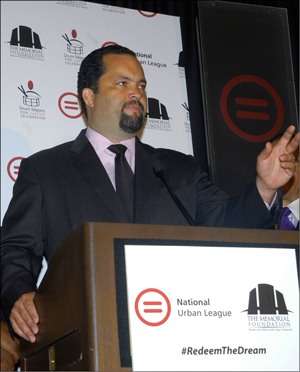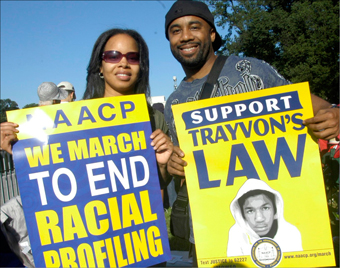Jealous leaving NAACP to seek GOP allies for civil rights and to build a Super PAC
By Hazel Trice Edney | Last updated: Sep 23, 2013 - 9:55:01 AMWhat's your opinion on this article?

NAACP CEO Ben Jealous
|
“The reality is that, you’ve seen it with my outreach to (Newt) Gingrich and (Grover) Norquist and (Virginia) Governor Bob McDonnell on criminal justice reform issues. The reality is that as a people, we were most effective in pushing our agenda when we had one agenda that was shared between Black members of both parties,” Mr. Jealous said in an exclusive interview with the Trice Edney News Wire. “And so we’ve got to get back to civil rights having a beachhead in both parties and there being a common civil rights agenda that is shared and is held in common by Black Democrats and Black Republicans.”
Listing a string of elected Republicans with whom he has found common ground, Mr. Jealous says he sees signs that this movement could be successful.
“It has been very hard sometimes in these partisan times, but we have found allies in unlikely places,” he said. “Governor Deal in Georgia is helping to downsize prisons. So is Rick Perry in Texas. Gov. Kasich in Ohio is a big proponent of affirmative action for the business sector. Gov. McDonald of Virginia has been proponent of second chances, both in employment and in voting. And the question is, if a Republican can stand for any of this anywhere, then why can’t they stand for all of this everywhere? So, I think it’s important that we get back to doing what (Congresswoman) Shirley Chisholm admonished all of us and that is, ‘We have no permanent friends. We have no permanent enemies. We just have permanent interests.’ ”

Outgoing NAACP leader Ben Jealous wants to make civil rights a bi-partisan issue. Photos: Richard B, Muhammad
|
“We’re going to figure out whether or not now is the time that we can succeed in building a super PAC that will accelerate the breaking of state level glass ceilings of candidates of color across the South and Southwest,” he said. “Now is the time that we can finally create the equivalent of Emily’s List for people of color candidates with a real eye toward transformations that we think are possible in the South and the Southwest … breaking glass ceilings in those states in the former Confederacy and on out to California, and with progressives retaking the South, perhaps permanently.”
Emily’s list is a PAC founded in 1985 with a goal of electing pro-choice Democratic women to public office. Mr. Jealous says the PAC he envisions would include Republican and Democratic candidates. In recent history, the Democratic Party has been able to claim an overwhelming majority of the Black vote, consistently more than 90 percent in presidential elections. While Democrats are largely credited with civil rights gains, Mr. Jealous says many of the major gains of the 50s and 60s came about because of bi-partisan cooperation because of Blacks in both parties.
He recently expounded on his vision during an Aug. 26 forum sponsored by the W.K. Kellogg Foundation’s America Healing initiative, reflecting on the 50th Anniversary of the March on Washington.
“We have to, as a civil rights community, really think deeply—not just about how we build bonds amongst each other—but how we, frankly, reintroduce civil rights to the Republican Party, which for a hundred years was the party of civil rights in many ways,” he told the audience at the Washington, D.C.-based Newseum, where the forum was held.
“And I believe that if we, in the next 50 years, would get a little bit more sophisticated about how we work our politics, if we in the next 50 years could be a little bit more inspired, quite frankly by our grandparents and lessons that they understood very well. If we can get back to a place where civil rights is a little bit less partisan,” he added, “then we can move forward even faster than we think is possible.”
Although he believes civil rights must be universal, he says Blacks will have to initiate the movement.
“I think, quite frankly, the first courageous step is going to have to be with us saying that we’re going to have the hope to even talk to the other side of the aisle,” he told the forum audience. “Because right now, we reinforce the isolation of our own agenda in ways that may be expedited in the short term, but detrimental in the long term.”
His fellow civil rights leaders, still basking in the aftermath of the 50th anniversary of the March on Washington, expressed shock at the announcement of his resignation.
The Rev. Al Sharpton issued a statement:
“Ben Jealous has operated with integrity and a real sense of hands-on activism. Not only was he able to revive the NAACP and raise its budget to higher heights, he joined us in the streets in real civil rights activity on the ground. From the ‘suites to the streets’ he will be missed as head of the NAACP, but I am sure he will not leave us in his contribution to the struggle.”
NAACP Chair Roslyn Brock praised Mr. Jealous for his successes in a telephone press conference. She also issued a statement: “Under his leadership, the NAACP has built a highly competent staff that will carry our mission forward and meet the civil-rights challenges of the 21st century. Our board, staff and volunteer leaders throughout the country deeply appreciate his sacrifice and will continue to implement our game-changing goals for the next half century that include the restoration of Section 4 of the Voting Rights Act, implementing Trayvon’s Law, bolstering civic-engagement efforts and ensuring our community is enrolled in the Affordable Care Act exchanges.”
Mr. Jealous also said in the interview that he is pleased with his accomplishments.
“What I’m most proud of is that I leave the organization bigger, stronger, more powerful and more financially sustainable and with a clear set of priorities for the next half century,” he said. “Yes, like every NAACP leader, I leave here passing a baton on to the next person to help finish a race that will go on for a very long time. But I leave here knowing that we are better prepared to finish that race than we have been in a very long time.”
He hints at his desire to exacerbate the finish of that race—just from a new venue.
“Professionally, I’m very clear I’m going to go teach,” he said. “Personally, it’s very clear I need a lot more time at home to be Dad. Politically, I’m walking in with a question, which is, ‘Can this be done? Can we create a big, robust PAC that is ultimately funded from the grassroots to help accelerate the careers of transformative candidates of color?”
INSIDE STORIES AND REVIEWS
-
-
About Harriett ... and the Negro Hollywood Road Show
By Rabiah Muhammad, Guest Columnist » Full Story -
Skepticism greets Jay-Z, NFL talk of inspiring change
By Bryan 18X Crawford and Richard B. Muhammad The Final Call Newspaper @TheFinalCall » Full Story -
The painful problem of Black girls and suicide
By Charlene Muhammad -National Correspondent- » Full Story -
Exploitation of Innocence - Report: Perceptions, policies hurting Black girls
By Charlene Muhammad -National Correspondent- » Full Story -
Big Ballin: Big ideas fuel a father’s Big Baller Brand and brash business sense
By Bryan Crawford -Contributing Writer- » Full Story






 Click Here Stay Connected!
Click Here Stay Connected!








